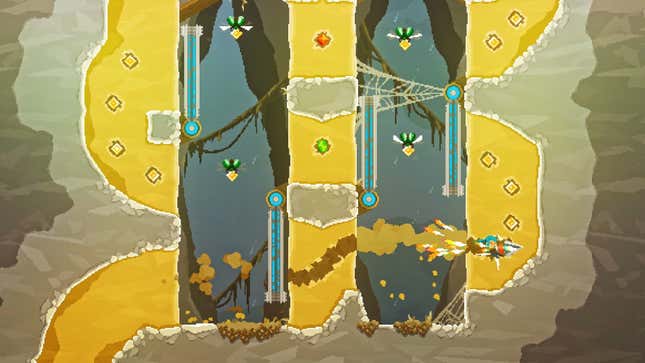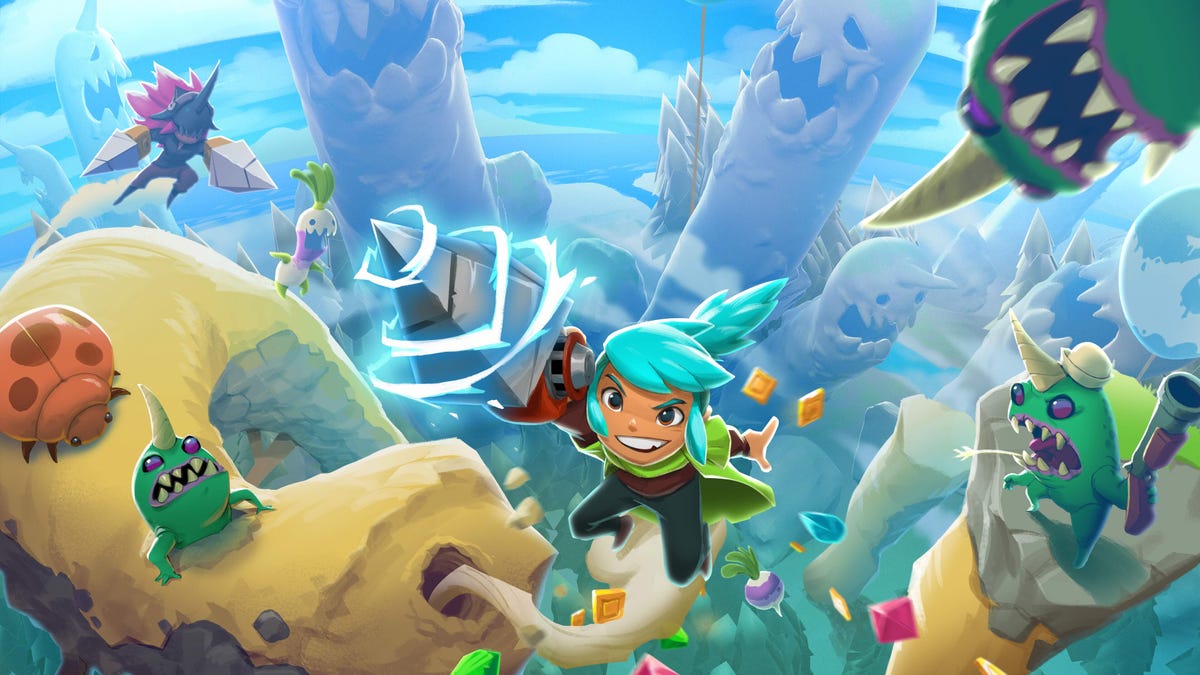When I first saw Pepper Grinder, I was struck by how brash it appeared to be. It was this loud, kinetic, almost volatile game that felt like it was tapping into a kind of chaos that other, more sanitized platformers rejected. Crucially, it accomplished this by handing the player a large drill and urging them to fuck everything up. Finally, a game that was speaking my language. Pepper Grinder largely lives up to this promise of high-octane platforming, digging, and managed disorder, but it takes a while to get to the juiciest bits of the game, and then, before you know it, it’s over.
The Week In Games: What’s Coming Out Beyond Super Mario RPG
Pepper Grinder begins as your character washes up on the shore of a goblin-infested land. You’re quickly given the largest drill known to man and let loose on the hordes. Along the way, you learn to dig, pick up a grappling hook, and gain various attachments for your drill that significantly alter your abilities, including a machine gun and, eventually, even a mech. Pepper Grinder begins fairly humbly before exploding into a raucous and unhinged journey. At its core, though, this is a platformer built around one really great mechanic, and it thankfully gets it really right.
Pepper Grinder’s movement is key to why it works as well as it does. Being able to burrow into certain surfaces and then jettison yourself out the other end never gets old over the game’s four-hour runtime. My finger rarely lifted from the trigger that revved up the drill, and I think I spent more time in the ground than I did above it. Drilling and flowing through the ground as if it was water became second nature, and the very best parts of Pepper Grinder lean into that. My favorite stage—a bonus level in the third world—just asks you to keep your momentum as you fly between falling blocks of ice down one long corridor, and it’s easily one of the most thrilling levels I’ve played this year. When it drills down on the dopamine-dealing basics and challenges you to keep your cool in the face of chaos, Pepper Grinder is a thrilling platformer.
Pepper Grinder’s greatest issue is, oddly enough, also one of its strengths: its brevity. The first several stages and worlds lay out the foundation thoroughly enough that by the time I got to the back half, I felt like a seasoned pro. In fact, Pepper Grinder spends so much time ushering you through the motions that it ends up feeling a little hesitant to add more layers when it counts. No sooner is a new mechanic introduced, like sprinklers that form quickly dissolving platforms in magma, than the game moves onto the next, so you don’t get that exciting evolution you sometimes find in games like this where new elements combine with each other to create a sense of constant escalation and change.Though the final act is explosive and the climax features some crowd-pleasing setpieces, the game ends before having that one “a-ha” moment in which it all comes together.

Some of Pepper Grinder’s detours and mechanics feel additive, but others feel like a bit of a destabilizing agent, especially where combat is involved. The occasional level will give you a gun attachment, for example, that completely transforms the game into a side-scrolling shooter, but rarely is there an occasion that calls for an involved strategy and plan of attack. While it admittedly shakes things up, turning you into a sometimes-stationary turret runs counter to the game’s strengths. Actually, this can be said of most of the “combat” in Pepper Grinder, which is fairly minimal throughout and is often over before you even know it, since just revving the drill and pointing it at most enemies will do the trick. It honestly feels like a bit of an afterthought.
More often than not you’ll have to propel yourself out of the ground—sometimes with a boost tied to one of the face buttons—and just bulldoze through flying sentries, bugs on the ground, and the stray goblin miner as you’re progressing through a level. Other times, you’ll be locked in a room until you take out these nests that spawn opponents, bringing the game’s momentum to a halt for a lackluster encounter when all I want to do is zoom through as quickly and efficiently as I can. Enemies often feel more like another surface waiting for you to drill through them than a separate and complementary obstacle.
Pepper Grinder’s boss fights, save for the infuriatingly inconsistent first one, are respectable encounters that try to challenge that notion, yet also serve as a reminder that the game is at its best when it’s asking the player to do anything but fight. The kinetic sequence leading up to the boss fight in the third world, for example, is exhilarating. The fight itself that closes out the chapter, however, falls short of its setup. The first and last of the game’s boss fights are a chore, but the middle few feel like decent attempts at marrying the movement and combat more successfully. To parrot an annoying trope of games writing that feels pretty true in this case, combat’s a bit of a mixed bag in Pepper Grinder.
Coming in at an immensely satisfying runtime of about four hours, Pepper Grinder is ultimately a wonderful little platformer to spend an evening or afternoon on. Even now, I (who almost never revisits a game, let alone one I’m reviewing) have booted it back up to dive into one of its bite-sized levels because of how great it feels to just move in it. To dig. To drill. I’m not likely to tackle one of Pepper Grinder’s action-focused levels again, save for the grand finale maybe, but that doesn’t mean there isn’t a lot it doesn’t get right. I just wish there was more of what worked to go around.
Pepper Grinder is available now on PC and Switch.
